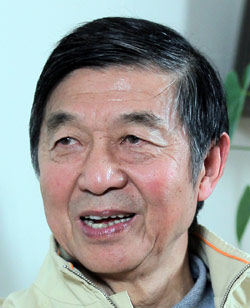Abe's policies toward China to boomerang
Updated: 2014-01-02 01:08
By WU JIAO and ZHANG YUNBI (China Daily)
|
|||||||||||
|
 |
|
Wu Jianmin |
Japanese Prime Minister Shinzo Abe's nationalistic policies will "not go far", as his country's economic interests are intertwined with the world's, especially in Asia, a veteran diplomat says.
Abe's counter-China policies will boomerang, said Wu Jianmin, 74, executive vice-chairman of the China Institute for Innovation and Development Strategy, a think tank.
Wu made the comments in an interview with China Daily in late December, with Abe proceeding with hawkish policies during his one year in office.
"What Shinzo Abe did is not accidental, but has a complicated background," Wu said.
Regional tensions increased on Dec 26 when Abe visited the Yasukuni Shrine, which honors 14 Class-A war criminals from World War II. The visit was the first to the shrine by a Japanese prime minister in office since 2006.
Japan has experienced economic stagnation since its economic bubble burst in the 1990s, and it has seen seven prime ministers in six years.
"Under such circumstances, Abe is flying the banner of nationalism to fan the public mood and shore up his public image," Wu said.
He said Abe's nationalism has alarmed not only China, but many others, including the United States.
Given that Japan's interests are deeply rooted in Asia and that it is impossible for the country to risk its "enormous" trade with China, Abe's nationalism "will not go far", Wu said.
He also said that China and some of its neighbors should manage and control tensions. People-to-people exchanges and economic cooperation between China and Japan should be advanced, Wu added.
His comments come as China faces challenges in the region from competing territorial claims.
Wu said confrontations have led to great losses on all sides and have affected cooperation bilaterally and regionally.
"Some people said confrontation is affordable. But do they calculate the cost of the confrontation? Do they want an everybody-is-a-loser situation to persist?" Wu asked.
"The relationship between China and neighboring countries has developed enormously in the past 30 years, creating huge common interests, which have every reason to be preserved," Wu said.
He also voiced optimism for growth in the Asia-Pacific region and for stability, although disputes and the US Asia-pivot strategy have caused conflicts in the region.
Contact the writers at wujiao@chinadaily.com.cn and zhangyunbi@chinadaily.com.cn
Related Stories
Japan's minister visits Yasukuni Shrine 2014-01-01 14:43
China concords with ROK on Yasukuni visit 2013-12-31 20:01
Beijing turns cold shoulder to Japan 2013-12-31 10:18
Abe's Yasukuni visit sparks world condemnation 2013-12-29 16:00
Former FM slams Abe's shrine visit 2013-12-28 18:05
Shrine visit fury mounts 2013-12-28 00:31
Today's Top News
IOC President condemns terrorism in Russia
Antarctic helicopter rescue delayed
Putin meets Volgograd bombing victims
Diplomacy to focus on neighborhood
Former Israeli PM's health worsens
NGO ends SOS on funding
Palestinian envoy in Prague killed
Abe's policies to boomerang
Hot Topics
Lunar probe , China growth forecasts, Emission rules get tougher, China seen through 'colored lens', International board,
Editor's Picks

|

|

|

|

|

|





